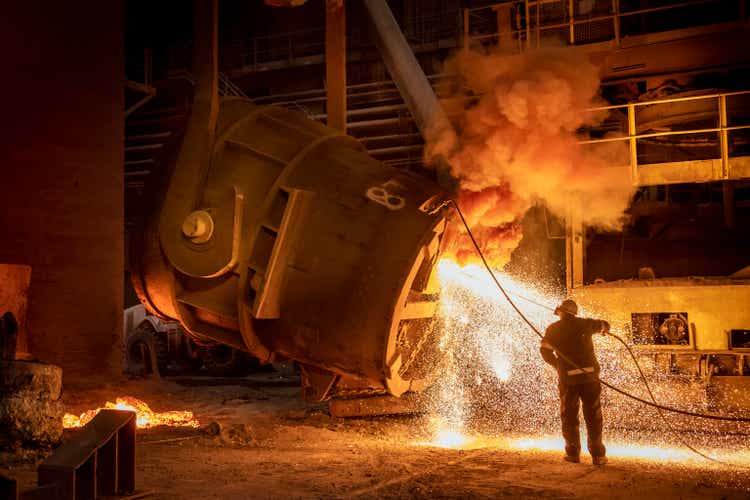Is China’s State Trader Stopping BHP Iron Ore Amid Dispute?

Published: 2025-09-19 08:38:36 | Category: Trump GNEWS Search
China's state-run trader has reportedly instructed steel mills to cease the use of a popular iron ore product from BHP Group due to a breakdown in negotiations regarding long-term contracts. This development signals increasing tensions between China and major commodity suppliers, as the iron ore market faces disruptions that could have significant repercussions for both nations’ economies.
Last updated: 19 September 2025 (BST)
Overview of the Iron Ore Disruption
The recent directive from China Mineral Resources Group Co. highlights a critical moment in the iron ore sector. This state-run entity was established by the Chinese government with the aim of enhancing the country's mineral resource management, including securing reliable long-term contracts with suppliers like BHP Group. The halt reportedly comes amid stalled discussions regarding the renewal of these contracts, raising concerns about the supply chain and pricing stability in the global iron ore market.
Key Takeaways
- China's state-run entity has paused the use of BHP's iron ore product.
- Disruption follows failed negotiations on long-term supply contracts.
- Potential economic impacts on both China and Australia, BHP's home country.
- The incident reflects rising tensions in the commodity trade landscape.
- Steel mills in China may face supply constraints due to this halt.
The Role of BHP in the Global Iron Ore Market
BHP Group is one of the largest producers of iron ore globally, with significant operations in Australia. The company supplies a considerable portion of the iron ore that fuels China's steel industry. Iron ore is a critical raw material for steel production, making BHP's role vital in the supply chain.
Understanding China’s Iron Ore Demand
China is the world’s largest consumer of iron ore, driven by its vast steel production capabilities. The country’s steel mills rely heavily on imports to meet their production needs, with BHP being one of their key suppliers. Any disruptions in the supply of iron ore can significantly impact China's steel output, which, in turn, affects various industries and the overall economy.
The Implications of the Supply Halt
The decision to halt the use of BHP's iron ore product could lead to several immediate consequences:
- Supply Chain Disruptions: Steel mills may struggle to find alternative sources of iron ore, leading to production delays.
- Price Volatility: A sudden drop in demand for BHP's iron ore could lead to fluctuations in global iron ore prices.
- Economic Ramifications: Both Australian and Chinese economies could face repercussions due to their intertwined trade relations.
Potential Economic Impact on Australia
Australia’s economy is heavily reliant on its mining sector, particularly iron ore exports. A protracted dispute with China could lead to reduced export revenues for BHP, affecting not only the company's financial health but also the broader Australian economy. Analysts will be closely monitoring how the Australian government responds to this situation, especially given the importance of trade relations with China.
Market Reactions
Following the news of the supply halt, BHP's stock may experience volatility as investors react to the potential implications of this dispute. Market analysts often pay close attention to international trade dynamics, and any prolonged disruption in iron ore supply could lead to a reassessment of BHP’s future growth prospects.
Future of BHP and China’s Iron Ore Trade
The immediate future of BHP's operations in China will depend on the outcome of ongoing negotiations. If the dispute continues without resolution, BHP may need to explore alternative markets or adjust its production strategies. Additionally, China might seek to diversify its iron ore sources to mitigate risks associated with reliance on a single supplier.
What Happens Next?
As negotiations resume, several factors will influence the outcome:
- Negotiation Strategies: Both parties will need to approach discussions with flexibility to reach a mutually beneficial agreement.
- Global Market Conditions: Fluctuations in global iron ore demand and supply could shift the balance of power in these negotiations.
- Regulatory Changes: Any government interventions or changes in trade policies could impact the dynamics of the negotiations.
Conclusion
The halt of BHP's iron ore supply to Chinese steel mills, as directed by China Mineral Resources Group Co., underscores the fragile nature of international trade relations in the commodity market. As both nations navigate these tensions, the outcome will significantly influence not just the iron ore market, but also the broader economic landscapes of Australia and China. How these negotiations unfold could set a precedent for future dealings in the global commodities market.
What strategies do you think BHP should employ to mitigate the impact of this dispute? #IronOre #BHPGroup #ChinaTrade
FAQs
What caused the halt in BHP's iron ore supply to China?
The halt was reportedly initiated by China Mineral Resources Group Co. due to stalled negotiations regarding long-term supply contracts with BHP.
How significant is BHP's role in the iron ore market?
BHP Group is one of the largest iron ore producers globally, supplying a substantial amount of iron ore to Chinese steel mills, which are crucial for the steel production industry.
What are the potential impacts of this supply disruption?
The supply disruption could lead to increased price volatility in the iron ore market, supply chain issues for Chinese steel mills, and economic repercussions for both Australia and China.
How might BHP respond to this situation?
BHP may need to explore alternative markets or adjust its production strategies depending on how negotiations with China progress.
What is the broader context of this dispute?
This dispute reflects rising tensions in international trade, particularly concerning commodity supplies, and highlights the complexities of global supply chains.



